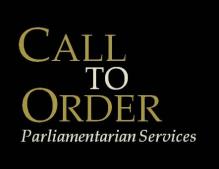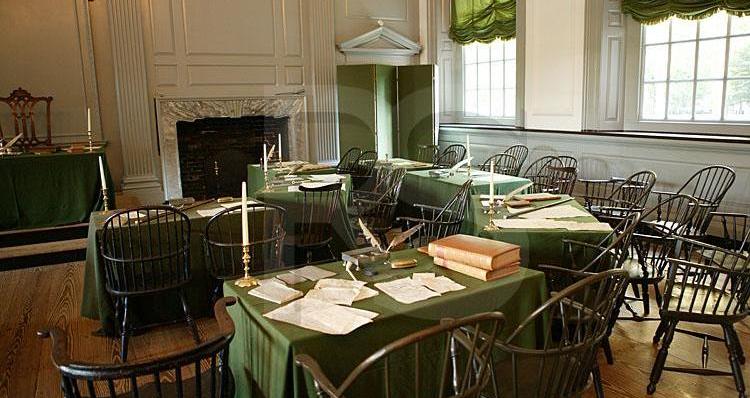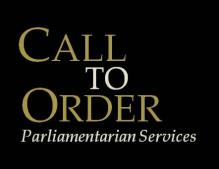In Mr. Smith Goes to Washington, the naïve Mr. Smith yields the Senate floor out of courtesy to a colleague, In doing so he loses his ability to debate on his legislation to prevent graft and corruption, Mr. Smith learned the hard way about the importance of knowing procedural rules. Officers and members of boards and and associations need to know the rules of order to achieve their goals and help their enterprises succeed. Our expertise includes:
- Meeting and Session Governance Services
- Presiding Officer Services
- Delegate Convention or Assembly Services
- Strategic Procedural Planning Services
- Bylaw Drafting, Review, and Revision Services
- Written Opinions Services
- Training Programs
Call out the sheriff! Legislators on the lamb!
Madison, WI -- Wisconsin Republican Governor Scott Walker needs to balance the budget, and he wants to do it by cutting spending and eliminating certain collective bargaining procedures of various government unions. His budget bill is being taken up by the Wisconsin State Senate where Republicans hold the majority of 19 to 14. But, fiscal bills require a quorum of three-fifths (60%) of the Senate members or 19.8 rounded to 20. Democrats have fled the state of Wisconsin to prevent a vote from being taken that they know they will lose.
The State Republican Senator Scott Fitzgerald made a motion for a call of the Senate. The motion for a call of the house in general parliamentary procedure requires, if adopted, the Sergeant at Arms lock to the doors of the assembly, after which a roll call is taken to find out who is present and more importantly who is absent without excuse. Those who are absent without excuse can be arrested and brought to the assembly. Generally, legislative bodies are the only types of assemblies that have the power to enforce a motion for a call of the the house. The Wisconsin State Senate has this authority. So now, 14 Democrat Senators are on the lamb and generally believed to be in Illinois.
The last time I can remember this happening was in Texas in 2004 when the Texas legislature was about to take a vote on the redistricting plan put together by the Republican controlled legislature. The Democrat members of the Texas legislature fled to Louisiana to prevent a quorum from being present and thereby stalling the plan from being implemented. (Needless to say, if the plan were implemented Democrats stood to lose some seats.) The Texas Rangers gathered up a posse to round up the fleeing legislators. You can't help but chuckle at the thought of a posse of Texas Rangers on horses chasing down those delinquent legislators!
The mere fact that a motion for a call of the house exists says something about us humans and the lengths that we're willing to go to have our way. Back at our nation's founding, one of the charges against King George in the Declaration of Independence was that "HE has called together Legislative Bodies at Places unusual, uncomfortable, and distant from the Depository of their public Records, for the sole Purpose of fatiguing them into Compliance with his Measures." Of course this was considered unfair. I wonder what the founders would say of the actions of either of the Wisconsin Democrats or the Texas Democrats?

© 2011 - 2013 Call To Order Parlimentarian Services
In the News
Independence Hall, Philadelphia,PA is where the Second Continental Congress debated and passed the Declaration of Independence, and where the Constitutional Convention debated and adoped the U.S. Constitution.

| Join Our Mailing List |
In Mr. Smith Goes to Washington, the naïve Mr. Smith yields the Senate floor out of courtesy to a colleague, In doing so he loses his ability to debate on his legislation to prevent graft and corruption, Mr. Smith learned the hard way about the importance of knowing procedural rules. Officers and members of boards and and associations need to know the rules of order to achieve their goals and help their enterprises succeed. Our expertise includes:
- Meeting and Session Governance Services
- Presiding Officer Services
- Delegate Convention or Assembly Services
- Strategic Procedural Planning Services
- Bylaw Drafting, Review, and Revision Services
- Written Opinions Services
- Training Programs
U.S. Senate Filibuster Rule Averts the Nuclear Option
A 17 July 2013 Wall Street Journal headline reads, “Filibuster deal pulls Senate from the brink”—from the brink of nuclear war in the Senate. Several of President Obama’s nominees for various appointed positions have awaited confirmation under the Senate’s Constitutional “advice and consent” clause for up to two years. The delay arises because by Senate Rule XXII, 60 Senators must agree to end debate before a matter can be voted on. Because Republicans number 46 and because they wanted to continue debate on these nominees, no votes could be taken.
Democrats threatened to change the rules by what’s known as the “nuclear option” or, more appropriately, the Constitutional Option. The Constitutional Option, by various complicated and controversial arguments, would allow a majority of senators to change the rules even though the rules themselves require a two thirds vote to change them due to the Cloture motion itself. Because of its controversial nature, use of the Constitutional Option would create a tremendous uproar and completely destroy what little unity exists between the two parties—hence the moniker “nuclear option.”
Among many issues, two stand worthy of emphasis and are at the core of the debate: 1) should a minority be able to hold up nominations and legislation, and 2) should a majority be able to trounce on the minority by controversial methods.
According to the Federalist Papers, Joseph Story’s Commentaries on the U.S. Constitution, and other sources, the U.S. Senate is a more deliberative House of the Legislature and was designed to take it’s time in assessing legislation. Therefore, limits to debate have traditionally been frowned upon. In fact, the Senate by its own rules eliminated the motion for the Previous Question, which is a motion to end debate, by a two-thirds vote. With that, there was no way for the Senate to end debate until no Senator sought to debate a question any further. That is, one Senator could forestall action on any measure!
A member’s ability to debate is a fundamental right in parliamentary law but is also critical in making wise and proper decisions on matters. Most manuals of parliamentary procedure protect the debate rights of a minority by requiring a two-thirds vote to limit, extend limits, or close debate. This two-thirds rule also protects the majority from abuse of the right to debate from a small minority from debating a matter to a point where it is defeated—a filibuster.
In 1917, some members of the Senate became exasperated by the inability to end debate*. A group of Senators lead by Senator Thomas J. Walsh (D-MT) began to argue that Senate sessions only lasted two years and that no session of the Senate could bind future sessions to a set of rules. Since the U.S. Constitution provides that a majority can establish the rules of the Senate, each new two-year session of the Senate, by majority vote, could establish a new set of rules. As such, Walsh and his supporters threatened to establish this precedent.
The problem was that up to that time and continuing up to this day, the Senate has considered itself a perpetual body because only one-third of its members were up for election in any given election. The Senate has never considered itself dissolved. Thus, once the rules of the Senate were established, they remained in full force and effect and could only be changed as specified within the rules.
With these two opposing arguments and the certain disorder and animus that would occur if the group of Senators attempted to establish a new precedent, a compromise rule was established called the cloture motion. The cloture motion, established in Rule XXII, required a two-thirds vote to limit debate and bring a matter to a vote. The Senate eventually lowered the vote required to limit debate to 60 votes where it now stands.
As in 1917, the Democrats lead by Senator Reid threatened to use the Constitutional Option to change the rules. With the threat came a compromise as described in the Wall Street Journal article. The Constitutional Option remains untested as to whether it would withstand legal challenge were it ever to even get that far.
As to our two issues, even the U.S Senate in all its faults agrees that a small minority should not be allowed to forestall action. But because it has repeatedly chosen to avoid using the Constitutional Option, the Senate has also realized, as evidenced by the compromises that result, that the majority should not be able to trounce on the minority.
See the article Senate changes cloture rule without changing the Rules.
*The source of this historical description is found in Gold, Martin B., Gupta, Dimple (Fall 2004). “The Constitutional Option to Change Senate Rules and Procedures: A Majoritarian Means to Over Come the Filibuster.” Harvard Journal of Law and Policy, Vol. 28, No. 1 cited in Wikipedia Article at http://en.wikipedia.org/wiki/Nuclear_option.

In the News
Independence Hall, Philadelphia,PA is where the Second Continental Congress debated and passed the Declaration of Independence, and where the Constitutional Convention debated and adoped the U.S. Constitution.
